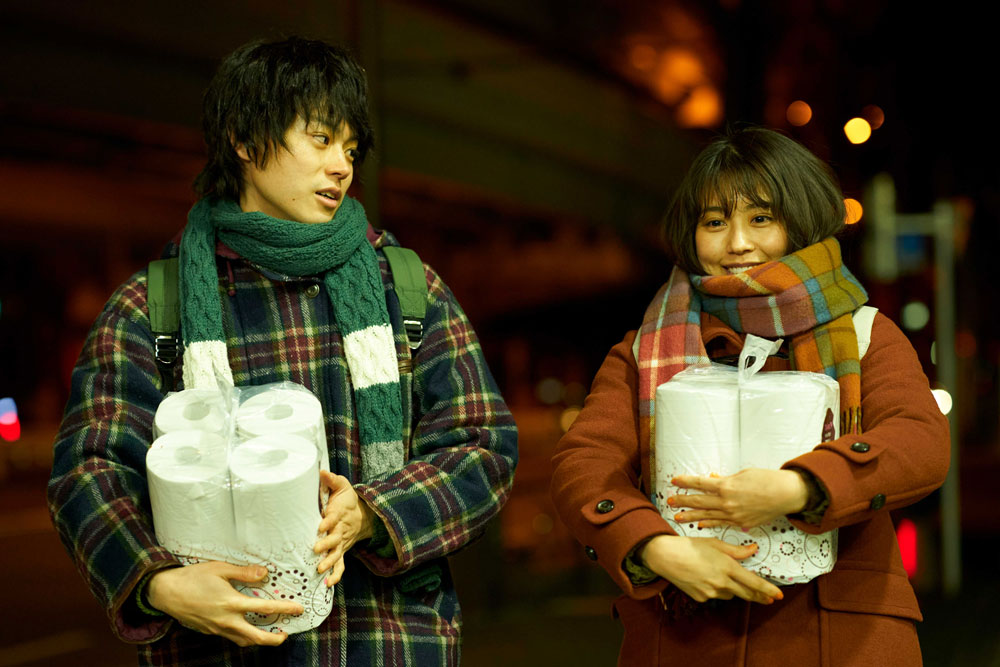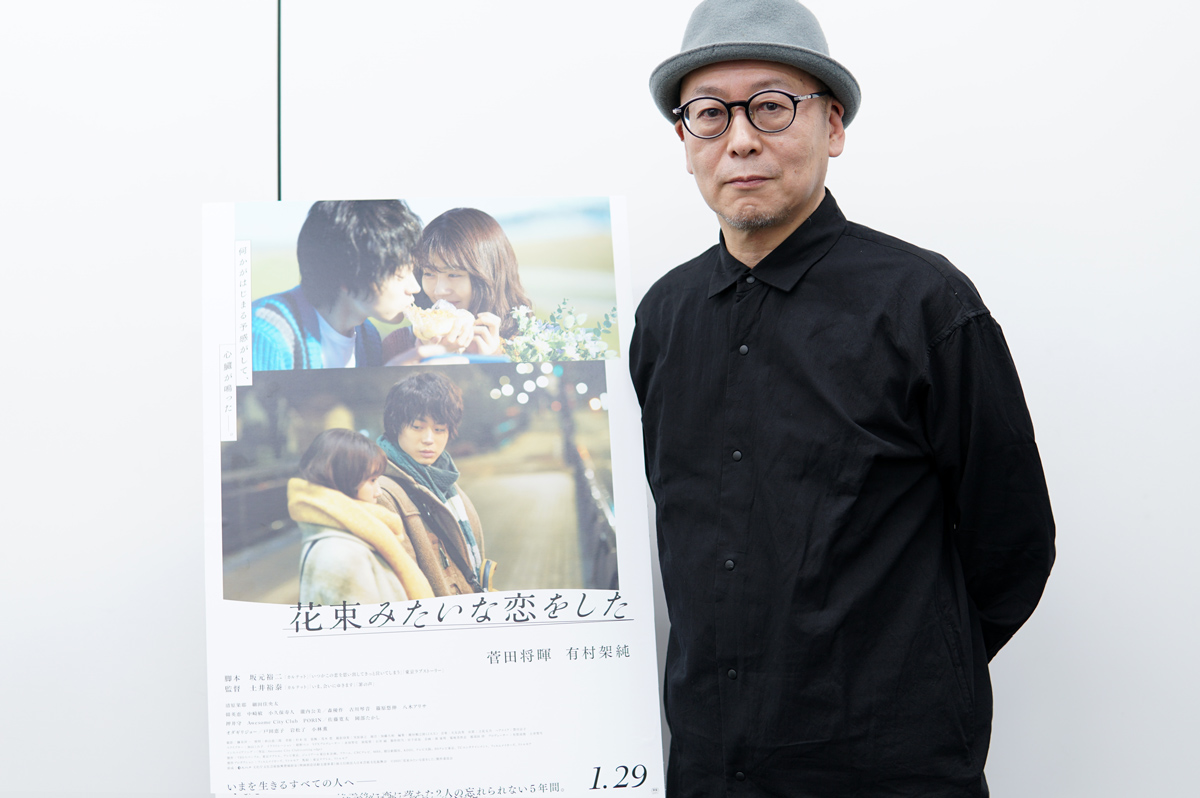!["I fell in love like a bouquet" The presence of Yuji Sakamoto, a screenwriter who changed director Hiroyasu Doi's "preparedness to challenge movies" [Director's Interview Vol.103]](https://cinemore.jp/images/f4e6da451b75a726409f98d0c2eb65c98dcd06ab8fdb76c2d8e9b565d8607ec3.jpg)
"I fell in love like a bouquet" The presence of Yuji Sakamoto, a screenwriter who changed director Hiroyasu Doi's "preparedness to challenge movies" [Director's Interview Vol.103]
It became a kind of “problem film” that is rare in modern Japanese films.
Q: Masaki Suda and Kasumi Arimura's natural acting was wonderful, but what kind of words did they say to them during filming?
Doi: I don't think either Suda-kun or Arimura-kun felt that they were directed by me. It's just a collection of everyday scenes, day in and day out. All I said to them was, ``It's fine as long as there's no lies in how you react or express your feelings toward what happens,'' and both of them fell into their roles naturally.
Of course, they had the script, so they probably knew what was going to happen next, but I don't think either Suda-kun or Arimura-san were thinking about that much while they were acting. It felt like I was only thinking about what would happen between the two of us today.
For me, there were parts where I made detailed adjustments while looking at the overall map, but rather than directing the scene, it was more like creating a place and time where there would be no lies between the two of us. .

(c)2021 “Love Like a Bouquet” Production Committee
Q: Speaking of the idea of ``eliminating lies,'' Mr. Sakamoto's script has very strong language, so I felt that it was difficult to blend it into the film. How is it going?
Doi: The script is like a diary, and the first half of the story revolves around monologues, so I felt it was a bit difficult. I was very careful about how to create a balance between the rhythm of the monologue scene and the rhythm of the dialogue scene.
For example, some scenes have only one line, while others span several pages. Without sacrificing the fun of slow and fast, we should instead bring the expressiveness of images to life. I was always thinking about that.
Q: It's very interesting that after going through such hardships, you finally feel like you have come into your own.
Doi: I still can't quite put into words what it means to be oneself (bitter smile), but if you pay close attention to the details, drama can be created in even the smallest things and the stories of ordinary people. I felt that again this time.
I think that's the theme of this film, and in that sense, I think it's going to be a kind of problematic film that you don't see in many Japanese films today (lol).
Pre-order “Love Like a Bouquet” now ↓

Director: Hiroyasu Doi
Born in 1964 in Hiroshima Prefecture. While attending Waseda University, he appeared on stage as an early member of the Yamanote Jyosha theater company. After The Graduate, he joined TBS and worked on a number of popular TV dramas as a director. "Tell Me I Love You" (1995), which depicts the pure love between a deaf painter and a theater troupe member who aspires to be an actress, won the Grand Prize in the Television Category at the 33rd Galaxy Awards, and was used as the theme song for DREAMS COME TRUE, "LOVE LOVE". LOVE” was also a huge hit, selling 2.5 million copies. The work was rebroadcast for the first time in 25 years as a ``2020 special edition'' during the coronavirus pandemic in 2020, and a remote alumni discussion between the stars Etsushi Toyokawa and Takako Tokiwa was also realized. It evoked a passionate response that transcended time. He was in charge of directing Yuji Sakamoto's screenplay for the first time in 2008's ``Kakki na Kanojo,'' and also served as chief producer for ``Quartet'' (17), which was a collaboration with him. In 2004, he entered the film directing industry with ``Ima, Ai ni Yukimasu''. ``Movie Biligal'' (2015), starring Kasumi Arimura, not only recorded a huge hit with box office revenue of over 2.8 billion yen, but also won the 39th Japan Academy Award for Outstanding Leading Actress and New Actor Award, and the 58th Japan Academy Award for Outstanding Lead Actress and New Actor Award. Blue Ribbon Award for Best Actress, 40th Hochi Film Award for Best Supporting Actress, 7th TAMA Film Award for Best Emerging Actor, 25th Japan Film Critics Award for Best Supporting Actor, 2015 Kaneto Shindo Award for Producer, etc. , which brought numerous awards to the cast and producers. In addition, his recent film ``Voice of Sin'' (2020) won three categories at the Hochi Film Awards: Best Picture, Best Actor, and Best Supporting Actor. Other major works include the dramas ``Blue The Birds'' (1997), ``Beautiful Life'' (2000), ``GOOD LUCK!!'' (2003), ``Manhattan Love Story'' (2003), ``Orange Days'' (2004), and ``Flying Public Relations Room.'' ” (13) “Stork” (15, 17) “Reprinted!” “It’s embarrassing to run away, but it’s useful” (16) “In this corner of the world” (18) “Nagi’s Time” (19) “Tomorrow’s Family” ” (20), movies such as “Namida Sosou” (2006), “Hanamizuki” (10), and “Kirin no Tsubasa ~Theatrical Version: Newcomer~” (12).
Interview and text: SYO
Born in 1987. After The Graduate from Tokyo Gakugei University, he worked at a film magazine editorial production site and a film information site before becoming a film writer/editor. Works on a wide range of topics including interviews, reviews, columns, event appearances, and recommendation comments. Contributed to ``CINEMORE'', ``Cinema Cafe'', ``Soen'', ``FRIDAY Digital'', ``CREA'', ``BRUTUS'', etc. Twitter「 syocinema 」
“I fell in love like a bouquet of flowers.”
Released nationwide at TOHO Cinemas Hibiya and other locations on Friday, January 29, 2021
(c)2021 “Love Like a Bouquet” Production Committee

